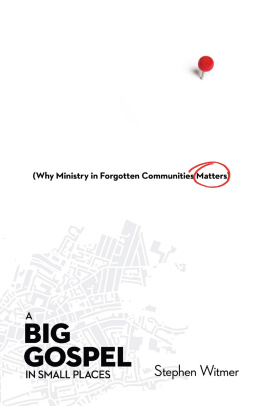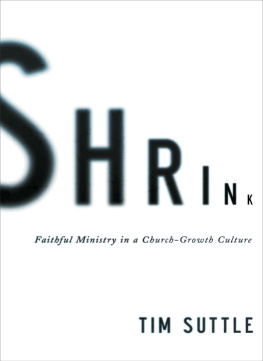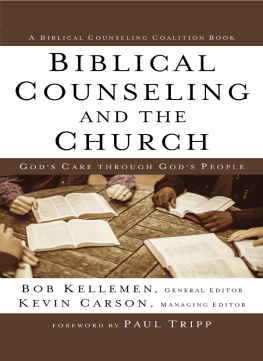2019 by Stephen E. Witmer
All rights reserved. No part of this book may be reproduced in any form without written permission
from InterVarsity Press.
InterVarsity Press is the book-publishing division of InterVarsity Christian Fellowship/USA,
a movement of students and faculty active on campus at hundreds of universities, colleges, and schools
of nursing in the United States of America, and a member movement of the International Fellowship
of Evangelical Students. For information about local and regional activities, visit intervarsity.org.
Scripture quotations, unless otherwise noted, are from The Holy Bible, English Standard Version, copyright 2001 by Crossway Bibles, a division of Good News Publishers. Used by permission. All rights reserved.
While any stories in this book are true, some names and identifying information may have been changed
to protect the privacy of individuals.
Foreword
RAY ORTLUND
I T IS WRITTEN, Whoever exalts himself will be humbled, and whoever humbles himself will be exalted (Matthew 23:12). Jesus said that, and he did not mean it as a mere ideal. Humility is, in fact, how human realities actually work. Pride cuts against the grain of Gods creation. Pride is like trying to get healthy on junk food or trying to go home by the wrong road. Humility is the secret key to everything gloriously human.
John Calvin thought his way back over one thousand years of Christian thought and noticed what mattered most to two of our greatest saints:
A saying of Chrysostoms has always pleased me very much, that the foundation of our philosophy is humility. But that of Augustine pleases me even more:... so if you ask me concerning the precepts of the Christian religion, first, second and third and always I would answer humility.
Three hundred years later Charles Simeon, an Anglican minister writing to a friend, identified the heart of Christian ministry:
Another observation of yours has not escaped my remembrancethe three lessons which a minister has to learn: 1. Humility. 2. Humility. 3. Humility. How long are we learning the true nature of Christianity!
Moving forward to the twentieth century, we read in C. S. Lewis what he has to say about pride, the worst thing about us:
According to Christian teachers, the essential vice, the utmost evil, is pride. Unchastity, anger, greed, drunkenness, and all that are mere fleabites in comparison. It was through pride that the devil became the devil. Pride leads to every other vice. It is the complete anti-God state of mind.
Historic Christianity agrees that humility is the only human condition God can bless. God himself said,
I dwell in the high and holy place,
and also with him who is of a contrite and lowly spirit,
to revive the spirit of the lowly,
and to revive the spirit of the contrite. (Isaiah 57:15)
All grandiosity offends God, especially ministry grandiosity. But all humility pleases God, especially ministry humility. We who serve the Lord are following an egoless nobody named Jesus who had no itch for prominent big-deal-ness. He is why small towns can be ideal settings for Gods greatest blessings.
I am not proposing that large cities are for arrogant pastors and small towns are for humble pastors. If only virtue were as easily attainable as a rural zip code! But I am noticing how consistent a modest ministry location is with the display of the glory of Jesus, who was despised and rejected by this worlds elite people. Doesnt his gospel flip all our values so that we are learning to say, Let the lowly brother boast in his exaltation, and the rich in his humiliation (James 1:9-10)? Small town ministry is not something to settle for. To quote the author of this wonderful book, Strategic isnt always what we think.
Stephen Witmer understands the ironies God has built into his strategies for us all. In writing A Big Gospel in Small Places, Pastor Witmer knows what hes writing aboutand where hes writing about. Serving Christ in a small Massachusetts town, as Stephen does, his ministry is a large kingdom commitment and an advantageous kingdom location. You doubt that? If we are honest, sometimes we do. But then we remember: Jesus came not from Rome, not even from Jerusalem, but from Nazareth, the equivalent to a small Massachusetts town of today. And even in glory above, right now our risen Lord still thinks of himself as a small-town man: I am Jesus of Nazareth (Acts 22:8). A Big Gospel in Small Places helps all of us to think with our Lords categories and thus to think more deeply, ironically, wisely, and cheerfully about the where and, even more, about the Who of our gospel ministries.
If Christ has called you to serve him, then the location of your ministry is none of your business. You just follow his call. Wherever he leads you, your life will be forever glorious because he can put his glory anywhere. To quote Francis Schaeffer, With God, there are no little people, no little places. What matters is not the size of our city or town but our consecration to the Lord in that city or town.
Wherever the Lord has called you, however modest in terms of this world, you can rejoice that he is the King of low places made strategic by his great plan. As you journey toward his celestial city, A Big Gospel in Small Places will help you keep on and keep on and keep on. And if the Lord has called you to a prominent place, this book will help you respect the churches in small places as equally significant in the eyes of Christ.
And all of us will humbly agree together, Let the one who boasts, boast in the Lord (1 Corinthians 1:31).












